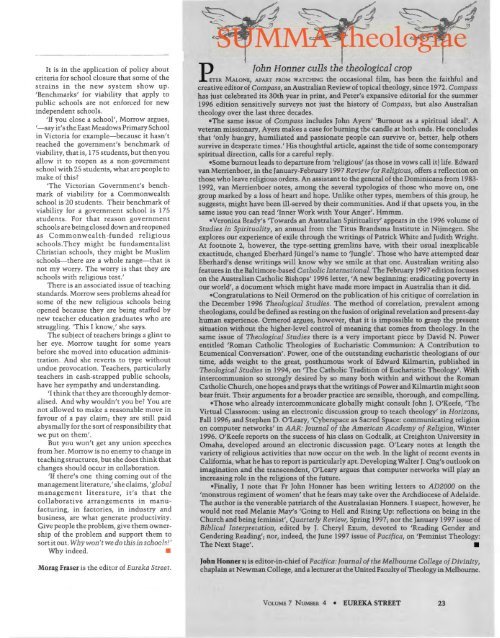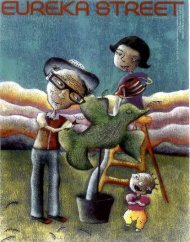n - Eureka Street
n - Eureka Street
n - Eureka Street
You also want an ePaper? Increase the reach of your titles
YUMPU automatically turns print PDFs into web optimized ePapers that Google loves.
It is in the application of policy aboutcriteria for school closure that some of thestrains in the new system show up.'Benchmarks' for viability that apply topublic schools are not enforced for newindependent schools.'If you close a school', Morrow argues,'-say it's the East Meadows Primary Schoolin Victoria for example-because it hasn'treached the government's benchmark ofviability, that is, 175 students, but then youallow it to reopen as a non-governmentschool with 25 students, what are people tomake of this?'The Victorian Government's benchmarkof viability for a Commonwealthschool is 20 students. Their benchmark ofviability for a government school is 175students. For that reason governmentschools are being closed down and reopenedas Common wealth-funded religiousschools.They might be fundamentalistChristian schools, they might be Muslimschools-there are a whole range-that isnot my worry. The worry is that they areschools with religious test.'There is an associated issue of teachingstandards. Morrow sees problems ahead forsome of the new religious schools beingopened because they are being staffed bynew teacher educa tion graduates who arestruggling. 'This I know,' she says.The subject of teachers brings a glint toher eye. Morrow taught for some yearsbefore she moved into education administration.And she reverts to type withoutundue provocation. Teachers, particularlyteachers in cash-strapped public schools,have her sympathy and understanding.'I think that they are thoroughly demoralised.And why wouldn't you be? You arenot allowed to make a reasonable move infavour of a pay claim; they are still paidabysmally for the sort of responsibility thatwe put on them'.But you won't get any union speechesfrom her. Morrow is no enemy to change inteaching structures, but she does think thatchanges should occur in collaboration.'If there's one thing coming out of themanagement literature,' she claims, 'globalm an agem ent literature, it's that thecollaborative arrange m ents in manufacturing,in factories, in industry andbusiness, are what generate productivity.Give people the problem, give them ownershipof the problem and support them tosort it out. Why won't we do this in schools!'Why indeed.•Morag Fraser is the editor of Eurelw <strong>Street</strong>.neolJohn Hanner culls the theological cropL nR MALONE, APART FROM WATCHING the occasional film, has been the faithful andcreative editor of Compass, an Australian Review of topical theology, since 1972. Compasshas just celebrated its 30th year in print, and Peter's expansive editorial for the summer1996 edition sensitively surveys not just the history of Compass, but also Australiantheology over the last three decades.•The same issue of Compass includes John Ayers' 'Burnout as a spiritual ideal'. Aveteran missionary, Ayers makes a case for burning the candle at both ends. He concludesthat 'only hungry, humiliated and passionate people can survive or, better, help otherssurvive in desperate times.' His thoughtful article, against the tide of some contemporaryspiritual direction, calls for a careful reply.•Some burnout leads to departure from 'religious' [as those in vows call it) life. Edwardvan Merrienboer, in the January-February 1997 Review for Religious, offers a reflection onthose who leave religious orders. An assistant to the general of the Dominicans from 1983-1992, van Merrienboer notes, among the several typologies of those who move on, onegroup marked by a loss of heart and hope. Unlike other types, members of this group, hesuggests, might have been ill-served by their communities. And if that upsets you, in thesame issue you can read 'Inner Work with Your Anger'. Hmmm.•Veronica Brady's 'Towards an Australian Spirituality' appears in the 1996 volume ofStudies in Spirituality, an annual from the Titus Brandsma Institute in Nijmegen. Sheexplores our experience of exile through the writings of Patrick White and Judith Wright.At footnote 2, however, the type-setting gremlins have, with their usual inexplicableexactitude, changed Eberhard Ji.ingel's name to 'Jungle'. Those who have attempted dearEberhard's dense writings will know why we smile at that one. Australian writing alsofeatures in the Baltimore-based Catholic International. The February 1997 edition focuseson the Australian Catholic Bishops' 1996letter, 'A new beginning: eradicating poverty inour world', a document which might have made more impact in Australia than it did.•Congratulations to Neil Ormerod on the publication of his critique of correlation inthe December 1996 Theological Studies. The method of correlation, prevalent amongtheologians, could be defined as resting on the fusion of original revelation and present-dayhuman experience. Ormerod argues, however, that it is impossible to grasp the presentsituation without the higher-level control of meaning that comes from theology. In thesame issue of Theological Studies there is a very important piece by David N. Powerentitled 'Roman Catholic Theologies of Eucharistic Communion: A Contribution toEcumenical Conversation'. Power, one of the outstanding eucharistic theologians of ourtime, adds weight to the great, posthumous work of Edward Kilmartin, published inTheological Studies in 1994, on 'The Catholic Tradition of Eucharistic Theology'. Withintercommunion so strongly desired by so many both within and without the RomanCatholic Church, one hopes and prays that the writings of Power and Kilmartin might soonbear fruit. Their arguments for a broader practice are sensible, thorough, and compelling.•Those who already intercommunicate globally might consult John J. O'Keefe, 'TheVirtual Classroom: using an electronic discussion group to teach theology' in Horizons,Fall1996; and Stephen D. O'Leary, 'Cyberspace as Sacred Space: communicating religionon computer networks' in AAR: Journal of the American Academy of Religion, Winter1996. O'Keefe reports on the success of his class on Godtalk, at Creighton University inOmaha, developed around an electronic discussion page. O'Leary notes at length thevariety of religious activities that now occur on the web. In the light of recent events inCalifornia, what he has to report is particularly apt. Developing Walter J. Ong's outlook onimagination and the transcendent, O'Leary argues that computer networks will play anincreasing role in the religions of the future.•Finally, I note that Fr John Henner has been writing letters to AD2000 on the'monstrous regiment of women' that he fears may take over the Archdiocese of Adelaide.The author is the venerable patriarch of the Australasian Hanners. I suspect, however, hewould not read Melanie May's 'Going to Hell and Rising Up: reflections on being in theChurch and being feminist', Quarterly Review, Spring 1997; nor the January 1997 issue ofBiblical Interpretation, edited by J. Cheryl Exum, devoted to 'Reading Gender andGendering Reading'; nor, indeed, the Jm1e 1997 issue of Pacifica, on 'Feminist Theology:The Next Stage'.•John Honner SJ is editor-in-chief of Pacifica: Journal of the Melbourne College of Divinity,chaplain at Newman College, and a lecturer at the United Faculty of Theology in Melboume.VoLUME 7 NuMBER 4 • EUREKA STREET 23
















